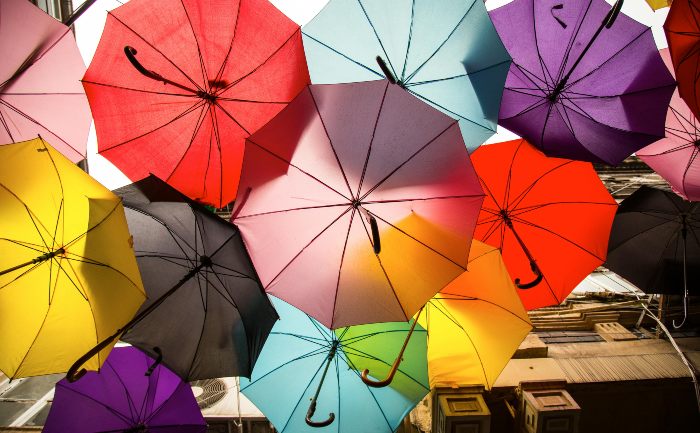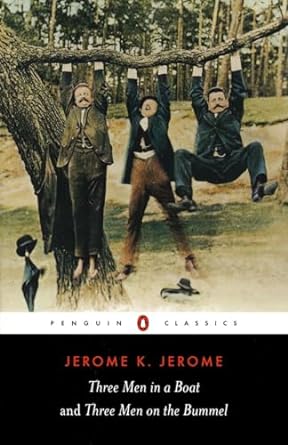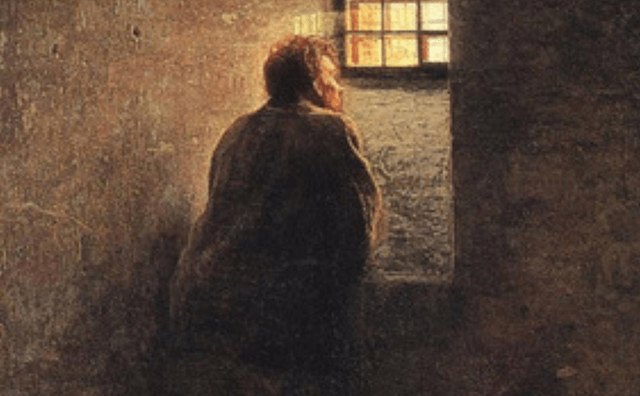On The Weather by Jerome K. Jerome

On The Weather by Jerome K. Jerome appears in the collection of humorous essays Idle Thoughts of an Idle Fellow, published in 1886.
This post may contain affiliate links that earn us a commission at no extra cost to you.
On The Weather by Jerome K. Jerome

On The Weather by Jerome K. Jerome
Things do go so contrary-like with me. I wanted to hit upon an especially novel, out-of-the-way subject for one of these articles. “I will write one paper about something altogether new,” I said to myself; “something that nobody else has ever written or talked about before; and then I can have it all my own way.” And I went about for days, trying to think of something of this kind; and I couldn’t. And Mrs. Cutting, our charwoman, came yesterday—I don’t mind mentioning her name, because I know she will not see this book. She would not look at such a frivolous publication. She never reads anything but the Bible and Lloyd’s Weekly News. All other literature she considers unnecessary and sinful.
She said: “Lor’, sir, you do look worried.”
I said: “Mrs. Cutting, I am trying to think of a subject the discussion of which will come upon the world in the nature of a startler—some subject upon which no previous human being has ever said a word—some subject that will attract by its novelty, invigorate by its surprising freshness.”
She laughed and said I was a funny gentleman.
That’s my luck again. When I make serious observations people chuckle; when I attempt a joke nobody sees it. I had a beautiful one last week. I thought it so good, and I worked it up and brought it in artfully at a dinner-party. I forget how exactly, but we had been talking about the attitude of Shakespeare toward the Reformation, and I said something and immediately added, “Ah, that reminds me; such a funny thing happened the other day in Whitechapel.” “Oh,” said they, “what was that?” “Oh, ’twas awfully funny,” I replied, beginning to giggle myself; “it will make you roar;” and I told it them.
There was dead silence when I finished—it was one of those long jokes, too—and then, at last, somebody said: “And that was the joke?”
I assured them that it was, and they were very polite and took my word for it. All but one old gentleman at the other end of the table, who wanted to know which was the joke—what he said to her or what she said to him; and we argued it out.
Some people are too much the other way. I knew a fellow once whose natural tendency to laugh at everything was so strong that if you wanted to talk seriously to him, you had to explain beforehand that what you were going to say would not be amusing. Unless you got him to clearly understand this, he would go off into fits of merriment over every word you uttered. I have known him on being asked the time stop short in the middle of the road, slap his leg, and burst into a roar of laughter. One never dared say anything really funny to that man. A good joke would have killed him on the spot.
In the present instance I vehemently repudiated the accusation of frivolity, and pressed Mrs. Cutting for practical ideas. She then became thoughtful and hazarded “samplers;” saying that she never heard them spoken much of now, but that they used to be all the rage when she was a girl.
I declined samplers and begged her to think again. She pondered a long while, with a tea-tray in her hands, and at last suggested the weather, which she was sure had been most trying of late.
And ever since that idiotic suggestion I have been unable to get the weather out of my thoughts or anything else in.
It certainly is most wretched weather. At all events it is so now at the time I am writing, and if it isn’t particularly unpleasant when I come to be read it soon will be.
It always is wretched weather according to us. The weather is like the government—always in the wrong. In summer-time we say it is stifling; in winter that it is killing; in spring and autumn we find fault with it for being neither one thing nor the other and wish it would make up its mind. If it is fine we say the country is being ruined for want of rain; if it does rain we pray for fine weather. If December passes without snow, we indignantly demand to know what has become of our good old-fashioned winters, and talk as if we had been cheated out of something we had bought and paid for; and when it does snow, our language is a disgrace to a Christian nation. We shall never be content until each man makes his own weather and keeps it to himself.
If that cannot be arranged, we would rather do without it altogether.
Yet I think it is only to us in cities that all weather is so unwelcome. In her own home, the country, Nature is sweet in all her moods. What can be more beautiful than the snow, falling big with mystery in silent softness, decking the fields and trees with white as if for a fairy wedding! And how delightful is a walk when the frozen ground rings beneath our swinging tread—when our blood tingles in the rare keen air, and the sheep-dogs’ distant bark and children’s laughter peals faintly clear like Alpine bells across the open hills! And then skating! scudding with wings of steel across the swaying ice, making whirring music as we fly. And oh, how dainty is spring—Nature at sweet eighteen!
When the little hopeful leaves peep out so fresh and green, so pure and bright, like young lives pushing shyly out into the bustling world; when the fruit-tree blossoms, pink and white, like village maidens in their Sunday frocks, hide each whitewashed cottage in a cloud of fragile splendor; and the cuckoo’s note upon the breeze is wafted through the woods! And summer, with its deep dark green and drowsy hum—when the rain-drops whisper solemn secrets to the listening leaves and the twilight lingers in the lanes! And autumn! ah, how sadly fair, with its golden glow and the dying grandeur of its tinted woods—its blood-red sunsets and its ghostly evening mists, with its busy murmur of reapers, and its laden orchards, and the calling of the gleaners, and the festivals of praise!
The very rain, and sleet, and hail seem only Nature’s useful servants when found doing their simple duties in the country; and the East Wind himself is nothing worse than a boisterous friend when we meet him between the hedge-rows.
But in the city where the painted stucco blisters under the smoky sun, and the sooty rain brings slush and mud, and the snow lies piled in dirty heaps, and the chill blasts whistle down dingy streets and shriek round flaring gas lit corners, no face of Nature charms us. Weather in towns is like a skylark in a counting-house—out of place and in the way. Towns ought to be covered in, warmed by hot-water pipes, and lighted by electricity. The weather is a country lass and does not appear to advantage in town. We liked well enough to flirt with her in the hay-field, but she does not seem so fascinating when we meet her in Pall Mall. There is too much of her there. The frank, free laugh and hearty voice that sounded so pleasant in the dairy jars against the artificiality of town-bred life, and her ways become exceedingly trying.
Just lately she has been favoring us with almost incessant rain for about three weeks; and I am a demned damp, moist, unpleasant body, as Mr. Mantalini puts it.
Our next-door neighbor comes out in the back garden every now and then and says it’s doing the country a world of good—not his coming out into the back garden, but the weather. He doesn’t understand anything about it, but ever since he started a cucumber-frame last summer he has regarded himself in the light of an agriculturist, and talks in this absurd way with the idea of impressing the rest of the terrace with the notion that he is a retired farmer. I can only hope that for this once he is correct, and that the weather really is doing good to something, because it is doing me a considerable amount of damage. It is spoiling both my clothes and my temper. The latter I can afford, as I have a good supply of it, but it wounds me to the quick to see my dear old hats and trousers sinking, prematurely worn and aged, beneath the cold world’s blasts and snows.
There is my new spring suit, too. A beautiful suit it was, and now it is hanging up so bespattered with mud I can’t bear to look at it.
That was Jim’s fault, that was. I should never have gone out in it that night if it had not been for him. I was just trying it on when he came in. He threw up his arms with a wild yell the moment he caught sight of it, and exclaimed that he had “got ’em again!”
I said: “Does it fit all right behind?”
“Spiffin, old man,” he replied. And then he wanted to know if I was coming out.
I said “no” at first, but he overruled me. He said that a man with a suit like that had no right to stop indoors. “Every citizen,” said he, “owes a duty to the public. Each one should contribute to the general happiness as far as lies in his power. Come out and give the girls a treat.”
Jim is slangy. I don’t know where he picks it up. It certainly is not from me.
I said: “Do you think it will really please ’em?” He said it would be like a day in the country to them.
That decided me. It was a lovely evening and I went.
When I got home I undressed and rubbed myself down with whisky, put my feet in hot water and a mustard-plaster on my chest, had a basin of gruel and a glass of hot brandy-and-water, tallowed my nose, and went to bed.
These prompt and vigorous measures, aided by a naturally strong constitution, were the means of preserving my life; but as for the suit! Well, there, it isn’t a suit; it’s a splash-board.
And I did fancy that suit, too. But that’s just the way. I never do get particularly fond of anything in this world but what something dreadful happens to it. I had a tame rat when I was a boy, and I loved that animal as only a boy would love an old water-rat; and one day it fell into a large dish of gooseberry-fool that was standing to cool in the kitchen, and nobody knew what had become of the poor creature until the second helping.
I do hate wet weather in town. At least, it is not so much the wet as the mud that I object to. Somehow or other I seem to possess an irresistible alluring power over mud. I have only to show myself in the street on a muddy day to be half-smothered by it. It all comes of being so attractive, as the old lady said when she was struck by lightning. Other people can go out on dirty days and walk about for hours without getting a speck upon themselves; while if I go across the road I come back a perfect disgrace to be seen (as in my boyish days my poor dear mother tried often to tell me). If there were only one dab of mud to be found in the whole of London, I am convinced I should carry it off from all competitors.
I wish I could return the affection, but I fear I never shall be able to. I have a horror of what they call the “London particular.” I feel miserable and muggy all through a dirty day, and it is quite a relief to pull one’s clothes off and get into bed, out of the way of it all. Everything goes wrong in wet weather. I don’t know how it is, but there always seem to me to be more people, and dogs, and perambulators, and cabs, and carts about in wet weather than at any other time, and they all get in your way more, and everybody is so disagreeable—except myself—and it does make me so wild. And then, too, somehow I always find myself carrying more things in wet weather than in dry; and when you have a bag, and three parcels, and a newspaper, and it suddenly comes on to rain, you can’t open your umbrella.
Which reminds me of another phase of the weather that I can’t bear, and that is April weather (so called because it always comes in May). Poets think it very nice. As it does not know its own mind five minutes together, they liken it to a woman; and it is supposed to be very charming on that account. I don’t appreciate it, myself. Such lightning-change business may be all very agreeable in a girl. It is no doubt highly delightful to have to do with a person who grins one moment about nothing at all, and snivels the next for precisely the same cause, and who then giggles, and then sulks, and who is rude, and affectionate, and bad-tempered, and jolly, and boisterous, and silent, and passionate, and cold, and stand-offish, and flopping, all in one minute (mind, I don’t say this. It is those poets. And they are supposed to be connoisseurs of this sort of thing); but in the weather the disadvantages of the system are more apparent. A woman’s tears do not make one wet, but the rain does; and her coldness does not lay the foundations of asthma and rheumatism, as the east wind is apt to. I can prepare for and put up with a regularly bad day, but these ha’porth-of-all-sorts kind of days do not suit me. It aggravates me to see a bright blue sky above me when I am walking along wet through, and there is something so exasperating about the way the sun comes out smiling after a drenching shower, and seems to say: “Lord love you, you don’t mean to say you’re wet? Well, I am surprised. Why, it was only my fun.”
They don’t give you time to open or shut your umbrella in an English April, especially if it is an “automaton” one—the umbrella, I mean, not the April.
I bought an “automaton” once in April, and I did have a time with it! I wanted an umbrella, and I went into a shop in the Strand and told them so, and they said:
“Yes, sir. What sort of an umbrella would you like?”
I said I should like one that would keep the rain off, and that would not allow itself to be left behind in a railway carriage.
“Try an ‘automaton,'” said the shopman.
“What’s an ‘automaton’?” said I.
“Oh, it’s a beautiful arrangement,” replied the man, with a touch of enthusiasm. “It opens and shuts itself.”
I bought one and found that he was quite correct. It did open and shut itself. I had no control over it whatever. When it began to rain, which it did that season every alternate five minutes, I used to try and get the machine to open, but it would not budge; and then I used to stand and struggle with the wretched thing, and shake it, and swear at it, while the rain poured down in torrents. Then the moment the rain ceased the absurd thing would go up suddenly with a jerk and would not come down again; and I had to walk about under a bright blue sky, with an umbrella over my head, wishing that it would come on to rain again, so that it might not seem that I was insane.
When it did shut it did so unexpectedly and knocked one’s hat off.
I don’t know why it should be so, but it is an undeniable fact that there is nothing makes a man look so supremely ridiculous as losing his hat. The feeling of helpless misery that shoots down one’s back on suddenly becoming aware that one’s head is bare is among the most bitter ills that flesh is heir to. And then there is the wild chase after it, accompanied by an excitable small dog, who thinks it is a game, and in the course of which you are certain to upset three or four innocent children—to say nothing of their mothers—butt a fat old gentleman on to the top of a perambulator, and carom off a ladies’ seminary into the arms of a wet sweep.
After this, the idiotic hilarity of the spectators and the disreputable appearance of the hat when recovered appear but of minor importance.
Altogether, what between March winds, April showers, and the entire absence of May flowers, spring is not a success in cities. It is all very well in the country, as I have said, but in towns whose population is anything over ten thousand it most certainly ought to be abolished. In the world’s grim workshops it is like the children—out of place. Neither shows to advantage amid the dust and din. It seems so sad to see the little dirt-grimed brats try to play in the noisy courts and muddy streets. Poor little uncared-for, unwanted human atoms, they are not children. Children are bright-eyed, chubby, and shy. These are dingy, screeching elves, their tiny faces seared and withered, their baby laughter cracked and hoarse.
The spring of life and the spring of the year were alike meant to be cradled in the green lap of nature. To us in the town spring brings but its cold winds and drizzling rains. We must seek it among the leafless woods and the brambly lanes, on the heathy moors and the great still hills, if we want to feel its joyous breath and hear its silent voices. There is a glorious freshness in the spring there. The scurrying clouds, the open bleakness, the rushing wind, and the clear bright air thrill one with vague energies and hopes. Life, like the landscape around us, seems bigger, and wider, and freer—a rainbow road leading to unknown ends. Through the silvery rents that bar the sky we seem to catch a glimpse of the great hope and grandeur that lies around this little throbbing world, and a breath of its scent is wafted us on the wings of the wild March wind.
Strange thoughts we do not understand are stirring in our hearts. Voices are calling us to some great effort, to some mighty work. But we do not comprehend their meaning yet, and the hidden echoes within us that would reply are struggling, inarticulate and dumb.
We stretch our hands like children to the light, seeking to grasp we know not what. Our thoughts, like the boys’ thoughts in the Danish song, are very long, long thoughts, and very vague; we cannot see their end.
It must be so. All thoughts that peer outside this narrow world cannot be else than dim and shapeless. The thoughts that we can clearly grasp are very little thoughts—that two and two make four-that when we are hungry it is pleasant to eat—that honesty is the best policy; all greater thoughts are undefined and vast to our poor childish brains. We see but dimly through the mists that roll around our time-girt isle of life, and only hear the distant surging of the great sea beyond.
Best Jerome K. Jerome Books to Read




If you enjoyed On The Weather by Jerome K. Jerome, you can also read The Man Who Would Manage by Jerome K. Jerome here
Narrated by Peter Thomlinson, courtesy of Librivox











